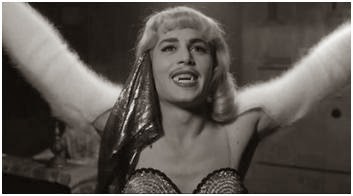Year: 1944 (USA)
Genre: Drama/Survival Film
Directed: Alfred Hitchcock
Stars: Tallulah Bankhead, William Bendix, Walter Slezak, Mary Anderson, John Hodiak, Henry Hull, Heather Angel, Hume Cronyn, Canada Lee
Production: 20th Century Fox
Lifeboat (1944) is considered one of Alfred Hitchcock's minor films. Much like Vertigo (1958) there are well defined and brilliantly acted characters, like Dial M for Murder (1954) the setting is tight and confined, in this case a sole lifeboat and not a London apartment. Also like Foreign Correspondent (1940) and Saboteur (1942), the movie has a blatant and obvious political purpose. It's a propaganda film through and through, myopically grappling on the zeitgeist of WWII.
But just like all the aforementioned films, Lifeboat is likewise a well made masterpiece.
 |
| Will they ever see Wilson again? |
The film begins just after the torpedoing of an
allied ship by a German U-Boat (which was also destroyed). A single lifeboat
carries an assorted crew including reporter Connie Porter (Tallulah Bankhead),
millionaire Charles Rittenhouse (Henry Hull), crew members John, Gus, Joe and
Stanley (William Bendix, John Hodiak, Canada Lee and Hume Cronyn respectively),
Nurse Alice (Mary Anderson), solemn passenger Mrs. Higgins (Heather Angel) and
a German U-Boat officer the rest dub Willy (Walter Slezak). At first the group
is suspicious of their fellow German survivor. Will the group be able to get
out of their predicament?
As you can imagine in an adapt-and-survive tale
like this there are a lot of man versus the elements moments which up the
suspense. The group faces raging winds and storms, a lack of potable water,
navigation without a compass and illness and injury. If solely taken for a
survival story, Lifeboat may just be
among the best the decade had to offer. The fact that the entire movie takes
place in and around a mid-sized dingy is a testament to Hitchcock's singularly
brilliant direction. Of course the well drawn characters were made whole by
John Steinbeck who distanced himself from the film for its "positive
portrayal" of the Nazi character.
 |
| Cuz we all know Nazis can't be cool blokes. |
The fact that many critics at the time
dismissed the film for being too pro-Nazi is an attestation to the fear and
hatred shared by the allies, particularly the British towards the Germans. In
newsreels, magazines and comic books the enemy was seen as subhuman and bloodthirsty.
In Lifeboat the character Willy was
sneaky, untrustworthy and manipulative and for that he was considered not
villainous enough? Who were they expecting; Beelzebub? Sauron…
 |
| This guy? |
I was half-expecting the survivors of the
shipwreck to be more symbiotic. The other half was hoping that if and when
things do get all "Lord of the Flies", when the survivors are rescued
there'd be a moment of contrition. Neither of these things happens and we're
left with a little too much chest-pounding for my taste; the voice of reason
and law muted by mob rule.
Of course I am too far removed from the
realities of the time. Hitchcock wanted to represent a group of squabbling
allies who mobilize to confront a seemingly invincible foe; a microcosm of the
larger conflicts of WWII. The animosities of the time were due to perceived
stakes and luckily I have never had to experience the cruelties of the Third
Reich first hand so who am I to talk? Transplanting a modern perspective on an
aged piece of art is like putting a CD player in a 1965 Mustang; it diminishes
the art.
 |
| Used to be the interior of a 1953 Studebaker. |
Lifeboat
ultimately is a masterpiece of the highest order. Engrossing, technically
flawless and thematically brilliant, the movie about a band of survivors faced
with the vastness of the Atlantic Ocean is yet another feather in Hitchcock's
derby. More than that, it's a telling piece of cinematic history that
accurately sums up the frightening uncertainty of a world consumed by war. Do you
a favor and set sail for Lifeboat.
 |
| ...or, you know, towards land |
Final Grade: B-














































